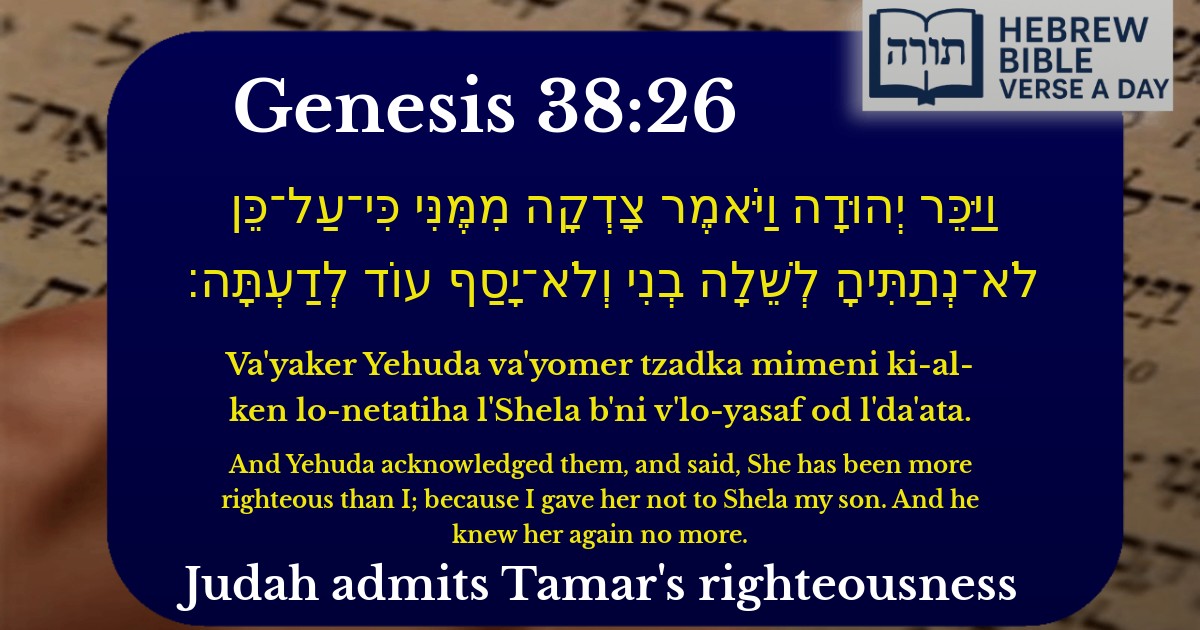Join Our Newsletter To Be Informed When New Videos Are Posted
Join the thousands of fellow Studends who rely on our videos to learn how to read the bible in Hebrew for free!
Hebrew Text
וַיַּכֵּר יְהוּדָה וַיֹּאמֶר צָדְקָה מִמֶּנִּי כִּי־עַל־כֵּן לֹא־נְתַתִּיהָ לְשֵׁלָה בְנִי וְלֹא־יָסַף עוֹד לְדַעְתָּה׃
English Translation
And Yehuda acknowledged them, and said, She has been more righteous than I; because I gave her not to Shela my son. And he knew her again no more.
Transliteration
Va'yaker Yehuda va'yomer tzadka mimeni ki-al-ken lo-netatiha l'Shela b'ni v'lo-yasaf od l'da'ata.
Hebrew Leining Text
וַיַּכֵּ֣ר יְהוּדָ֗ה וַיֹּ֙אמֶר֙ צָֽדְקָ֣ה מִמֶּ֔נִּי כִּֽי־עַל־כֵּ֥ן לֹא־נְתַתִּ֖יהָ לְשֵׁלָ֣ה בְנִ֑י וְלֹֽא־יָסַ֥ף ע֖וֹד לְדַעְתָּֽהּ׃
וַיַּכֵּ֣ר יְהוּדָ֗ה וַיֹּ֙אמֶר֙ צָֽדְקָ֣ה מִמֶּ֔נִּי כִּֽי־עַל־כֵּ֥ן לֹא־נְתַתִּ֖יהָ לְשֵׁלָ֣ה בְנִ֑י וְלֹֽא־יָסַ֥ף ע֖וֹד לְדַעְתָּֽהּ׃
🎵 Listen to leining
Parasha Commentary
📚 Talmud Citations
This verse is quoted in the Talmud.
📖 Sotah 10b
The verse is discussed in the context of Judah's admission of his wrongdoing and Tamar's righteousness, illustrating the importance of acknowledging one's mistakes.
📖 Sanhedrin 6b
The verse is referenced in a discussion about the qualities of righteous judgment and the importance of admitting the truth.


Context of the Verse
This verse (Bereishit 38:26) occurs in the narrative of Yehuda and Tamar, where Tamar, Yehuda's daughter-in-law, disguises herself as a prostitute to secure her rightful offspring after Yehuda fails to give her to his youngest son, Shela, as required by the laws of yibum (levirate marriage). When Yehuda discovers Tamar's pregnancy and initially condemns her, she presents his personal items as proof that he is the father, leading to his public admission of her righteousness.
Yehuda's Admission of Righteousness
Rashi explains that Yehuda's declaration, "צָדְקָה מִמֶּנִּי" ("She has been more righteous than I"), signifies his acknowledgment that Tamar acted justly in seeking to uphold the mitzvah of yibum, whereas he had neglected his obligation by withholding Shela from her. The Midrash (Bereishit Rabbah 85:11) elaborates that Yehuda admitted his error openly, demonstrating his integrity by not attempting to conceal the truth.
The Meaning of "כִּי־עַל־כֵּן לֹא־נְתַתִּיהָ לְשֵׁלָה בְנִי"
Yehuda confesses that his failure to give Tamar to Shela was unjust. The Ramban (Nachmanides) notes that Yehuda's admission reveals his recognition that Tamar's actions were motivated by a higher purpose—ensuring the continuity of her deceased husband's line—whereas he had acted out of personal concern for Shela's welfare (fearing he might die like his brothers). This highlights the tension between human caution and divine commandments.
"וְלֹא־יָסַף עוֹד לְדַעְתָּה" – Yehuda's Abstinence
The phrase "וְלֹא־יָסַף עוֹד לְדַעְתָּה" ("And he knew her again no more") is interpreted by the Talmud (Sotah 10b) as Yehuda's commitment to avoid further relations with Tamar, recognizing that their union had fulfilled its purpose. The Malbim explains that this restraint reflects Yehuda's teshuvah (repentance) and his resolve not to repeat his earlier mistakes.
Lessons from the Narrative